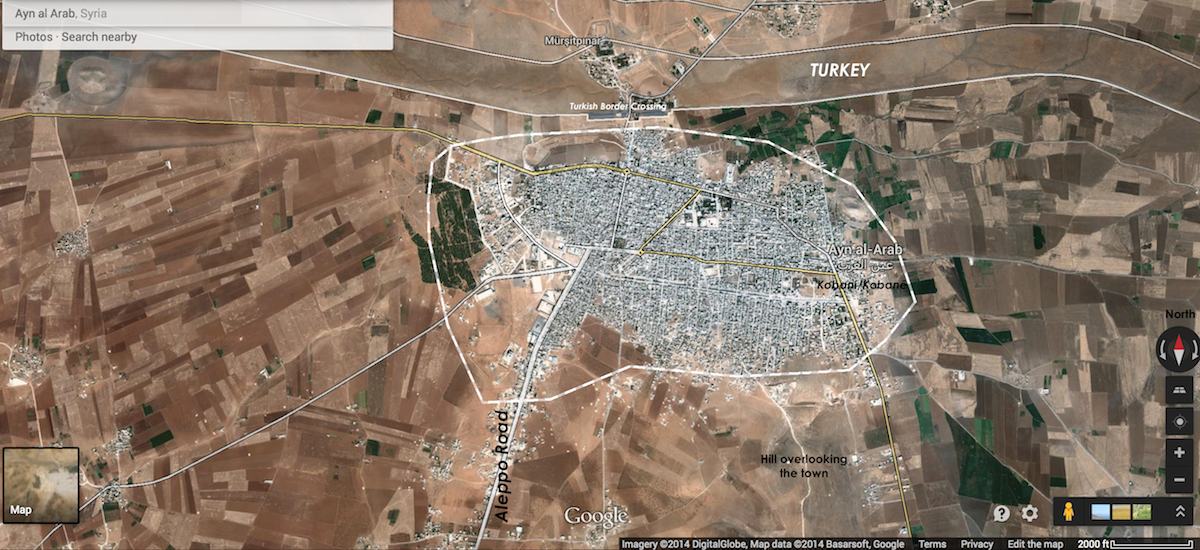The situation at Kobani now seems to be coming down to whether or not nearby Turkish ground troops and tanks will enter the fray, as the US cautioned that they could not break the siege with airstrikes:
Islamic State fighters have renewed their advance in the Syrian border town of Kobane, as the US warned air strikes alone could not save it.
At a news briefing, Pentagon spokesman Rear Adm John Kirby said: “Air strikes alone are not going to do this. They’re not going to save the town of Kobane. We know that.”
[…]
When asked if this meant Syrian towns could fall to IS, he said: “We all need to prepare ourselves for the reality that other towns and villages and perhaps Kobane will be taken by IS.”
Not only has Turkey still not let coalition planes use airbases close to Kobani — which would make it much easier to reach to offer air support — but Turkey appears to be discouraging the US from talking to Syrian Kurd commanders on the ground to gain real-time intelligence. This may be why coalition airstrikes have been so limited and ineffective at Kobani: there are no spotters on the ground to report rapidly shifting targets for American planes. In contrast, the airstrikes have been much more effective in breaking Iraqi sieges at Sinjar and Amirli in part because the US has a much stronger and pre-existing, working relationship with the anti-ISIS commanders on the ground, particularly within Iraq’s Kurdish Regional Government’s paramilitaries.
The US, of course, is also more focused on broader strategic targets that will break ISIS overall, not just at Kobani (from the BBC again):
Earlier US Secretary of State John Kerry said the US was deeply concerned about the people of Kobane. But he added: “Horrific as it is to watch the violence, it is important to keep in mind the US strategic objective” – which, he added, was to deprive IS of command-and-control centres and the infrastructure to carry out attacks.
But relief airstrikes have occurred in Iraq at several key points, which implies that if the United States had more ability to break the siege at Kobani, they would do so. A lot of that impediment seems to hinge on Turkey’s vacillation regarding how to handle the situation at Kobani (and its unwillingness to work with the Syrian Kurdish fighters or let the US work with them).
And either way, if ground troops are indeed necessary beyond the airstrikes if Kobani is to be rescued — a point on which both the US and Turkish leadership seem to agree — it should be the primary responsibility of the adjacent country with the 6th largest active duty military force in the world to step up and step in. Turkey’s refusal to do so is starting to ring more disingenuous with every passing day.
As the New York Times reported yesterday:
Even as it stepped up airstrikes against the militants Tuesday, the Obama administration was frustrated by what it regards as Turkey’s excuses for not doing more militarily. Officials note, for example, that the American-led coalition, with its heavy rotation of flights and airstrikes, has effectively imposed a no-fly zone over northern Syria already, so Mr. Erdogan’s demand for such a zone rings hollow.
“There’s growing angst about Turkey dragging its feet to act to prevent a massacre less than a mile from its border,” a senior administration official said. “After all the fulminating about Syria’s humanitarian catastrophe, they’re inventing reasons not to act to avoid another catastrophe.
Turkey’s leaders are being quite clever about suggesting semi-plausible reasons not to get involved until you remember they’ve been extensively meddling for 2-3 years and trumpeting “responsibility to protect” the vulnerable populations of Syria. It’s hard not to suspect Turkey is using the imminent fall of Kobani to try to blackmail the US into agreeing to pursue regime change in Syria explicitly, directly, and by force, which is not within the current public plans.
Whatever the reasons, this hesitation is going to be a decisive factor in the future of Kurdish relations with the government of Turkey. Failure to act will be held against Turkey for a long time and all the good will previously and recently reached will evaporate. We’re probably about the watch the AKP’s crowning security and foreign policy achievements — an emerging peace with the Kurds of Turkey and ties with the Kurds of Iraq — shatter into a million pieces before the paint has even dried on them.
Update: On Thursday, Turkey’s foreign minister said that the country would not send in ground forces alone — “It’s not realistic to expect that Turkey will lead a ground operation on its own.”

Map of Kobani / Ayn Al-Arab, Syria, October 5, 2014. 30 or more Turkish tanks are within eyesight, across the border. (Click map to see a larger version or click here to navigate in Google Maps.


